List of warehouses in Manchester
Manchester is a product of the Industrial Revolution, recognisable for its industrial past. The city is synonymous for its canals, railway viaducts, cotton mills and warehouses which were used to store or house goods before or after transit. As a result of the Industrial Revolution, the city amassed a wide array of warehouses dating from before the Victorian era (1837–1901) to the end of the Edwardian (1910).
The city has examples of six main warehouse types: display of goods, overseas, packing, shipping, railway and canal warehouses. In 1806 there were just over 1,000 but by 1815 this had almost doubled to 1,819. Manchester was dubbed "warehouse city". The earliest were built around King Street although by 1850 warehouses had spread to Portland Street and later to Whitworth Street. They are direct descendants of the canal warehouses of Castlefield.
Warehouses
[edit]| Warehouse | Image | Description | Completed | Ref. |
|---|---|---|---|---|
| Dale Street Warehouse Dale Street, Northern Quarter |
 |
Grade II*. Canal warehouse, including subterranean water-wheel. Built in 1806 by William Crossley. Recognised as the earliest canal warehouse in Manchester. | 1806 | [1] |
| 1830 warehouse, Liverpool Road railway station Liverpool Road, Castlefield |
 |
Grade I. Recognised as the world's first railway warehouse.[2][3] Designer is unknown, attributed to both architect Thomas Haigh and George Stephenson. | 1830 | [4][5] |
| Jackson's Warehouse Piccadilly Basin, Northern Quarter |
 |
Grade II*. One of the earliest examples of 'shipping holes', which allow boats to unpack goods under the building.[6] Renovated in 2003, now apartments and commercial space. | 1836 | [7] |
| Victoria and Albert Warehouses Water Street |
Grade II. Warehouses for Mersey and Irwell Navigation Company, now a hotel. | c. 1838 | [8][9] | |
| Bradley House 40 Port Street, Northern Quarter |
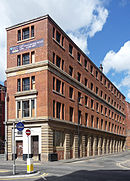 |
Grade II. Shipping warehouse, probably for Kessler & Co., a machine manufacturing company. One of the very few plainly decorated warehouses in Victorian Manchester, noted for its simple Georgian style. | 1850 | [10] |
| Watts Warehouse Portland Street, Manchester city centre |
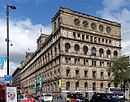 |
Grade II*. Ornate style typifies the extravagant confidence of many Mancunian warehouses of this period, but the Watts Warehouse is notable for its peculiarly eclectic design. Building has five storeys – each decorated in a different style – Italian Renaissance, Elizabethan, French Renaissance and Flemish – and roof pavilions featuring large Gothic wheel windows. | 1856 | [11] |
| 63 George Street 19 Dickinson Street, Manchester city centre |
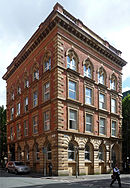 |
Grade II. Merchant's warehouse in an Italian palazzo style. Now offices and restaurant. | 1857 | [12] |
| Charlotte House Back George Street, Manchester city centre |
Grade II. Cotton merchants' warehouse by Edward Walters. Sandstone ashlar and light red brick exterior. Italian palazzo style. | 1857 | [13] | |
| Behrens Building 127–133 Portland Street, Manchester city centre |
 |
Grade II. Various shipping warehouses, built by P.Nunn for Louis Behrens and Sons. Red brick and sandstone exterior. Strong horizontal emphasis which fronts onto Portland Street. | 1860 | [14] |
| Lancashire House Bootle Street, Manchester city centre |
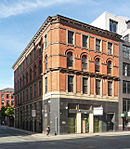 |
Grade II. Probably merchant's warehouse. Sandstone ashlar exterior at ground floor, red brick with sandstone dressings above | 1860 | [15] |
| 109 and 111, Portland Street | Grade II. Various warehouses, now partly bar and nightclub. Red brick exterior in Flemish
bond, with sandstone dressings and slate roof. A mixed eclectic style. |
1860 | [16] | |
| London Warehouse 10 Ducie Street |
 |
Grade II. Railway warehouse for Manchester, Sheffield and Lincolnshire Railway near the basin of the Ashton Canal. Originally four similar buildings were built, but only one remains.[17] | 1867 | [18] |
| Harvester House 2 Bootle Street |
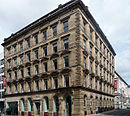 |
Grade II. Described as "probably a merchant's warehouse" by English Heritage. Designed by Clegg and Knowles; has altered. Sandstone ashlar exterior and slate roof. | 1868 | [19] |
| 101 Princess Street Major Street |
 |
Shipping warehouse by Clegg and Knowles in a Palazzo style. Red brick exterior in Flemish bond, with sandstone dressings (roof not visible from street). Parallelogram plan on island site with a rear loading bay. Later converted to offices and a nightclub. | 1869 | [20] |
| Brazil House 63 Bloom Street |
Grade II. Pair of shipping warehouses; now offices. Described as "Eclectic style, with some Gothic features" by English Heritage. | 1870 | [21] | |
| Albion Wharf 19 Albion Street |
 |
Grade II*. Red brick exterior with sandstone dressings and a slate roof. Designed in a Venetian Gothic style. | 1870 | [22] |
| Basil House 105 Portland Street |
 |
Grade II. Trade Warehouse. Probably iron-framed, with exterior of red brick, sandstone dressings and slate roof. Designed in an eclectic style. Forms group with No.103 to left, and with No. 109 and 111, and 113 to 119 to right, together comprising a complete block of former warehouses. | 1870 | [23] |
| Chepstow House Chepstow Street |
 |
Grade II. Originally shipping warehouse by Speakman, Son and Hickson, for textile merchant Sam Mendel. Red brick with sandstone dressings exterior. | 1874 | [24] |
| Central House 74 Princess Street |
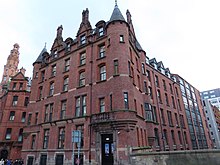 |
Shipping warehouse by Corson and Aitken. Red brick with red sandstone dressings, steeply-pitched
slate roof with obelisk finials. Described as "Scottish Baronial" style by English Heritage. |
1880 | [25] |
| Great Northern Warehouse Watson Street, Manchester |
 |
Grade II*. Built by Great Northern Railway. A unique survival of a 3-way railway goods exchange station, serving the railway, canal and road networks of the Manchester region. Built to be fully fire proof, it was considered in its day to be one of the most advanced railway goods exchanges in the country.[26] | 1885–96, and 1899 | [27] |
| 18–24 Princess Street |  |
c. 1870s | ||
| Sevendale House Spear Street |
 |
Grade II | 1903 | [28] |
| 1 Central Street County Street |
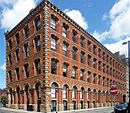 |
Grade II. Probably a warehouse in a simplified palazzo style. Now offices. | c. 1865 | [29] |
| Austin House 12 Charlotte Street |
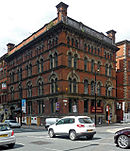 |
Grade II. Textile merchants' warehouses; now offices. Designed by Edward Walters in an Italian palazzo style. Altered since opening; now offices | 1860 | [30] |
| 12 Charlotte Street | Grade II. Built as a home trade warehouse. Extension of the Austin House warehouse building. Basement and five-storeys, sandstone ashlar exterior. Narrow plan on corner site. Now offices | 1870 | [31] | |
| 110–114 Portland Street |  |
Grade II. Warehousing, probably textiles or clothing. Designed by Charles Heathcote in an Romanesque style. Irregular trapeziform plan with sandstone ashlar and red brick exterior | 1880 | [32] |
| 49 Spring Gardens | 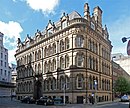 |
Grade II. Textiles warehouse by Alfred Waterhouse. Sandstone ashlar exterior and mansard slate roof.
Rectangular plan on end-of-block site, with curved corners, and loading bay to rear. Eclectic style, with some Gothic motifs. |
1891 | [33] |
| Tootal, Broadhurst and Lee Building Whitworth Street |
 |
Grade II*. Formerly home to Tootal, Broadhurst and Lee Co., a cotton manufacturing company.[34] | 1898 | [35] |
| 107 Piccadilly London Road |
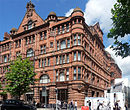 |
Grade II. Cotton manufacturers' showroom and warehouse, now hotel and restaurant. Designed by Charles Heathcote, possibly for Horrocks Crewdson & Co or Sparrow Hardwick & Company. | 1899 | [36] |
| Princes Building 34 Oxford Street |
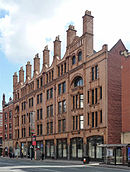 |
Grade II. Designed by I.R.E.Birkett in an Art Nouveau style. Now offices and retail units | 1903 | [37] |
| Asia House, Manchester 82 Princess Street |
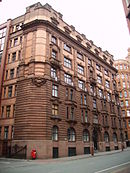 |
Grade II*. Edwardian Baroque by Harry S. Fairhurst. Interior described as "unusually elaborate" and "probably the best example of its kind in any Manchester warehouse" with Art Nouveau and Venetian Gothic motifs. | 1909 | [38] |
| Canada House 3 Chepstow Street |
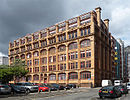 |
Grade II. Packing warehouse by William G. Higginbottom in Art Nouveau style. Five storeys with basement and double attic. Cast-iron frame with steel truss roof. | 1909 | [39] |
| Lancaster House, Manchester |  |
Edwardian Baroque by Harry S. Fairhurst. Grade II* | 1910 | [40] |
| Bridgewater House Whitworth Street |
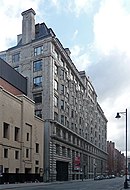 |
Packing and shipping warehouse by Harry S. Fairhurst. Grade II | 1912 | [41] |
See also
[edit]References
[edit]- ^ "Dale Warehouse, Manchester". britishlistedbuildings.co.uk. Retrieved 10 October 2012.
- ^ "Old Main Goods Warehouse". Engineering Timelines. Retrieved 10 October 2012.
- ^ "About us". Science and Industry Museum.
- ^ "Old Warehouse to North of Former Liverpool Road Railway Station, Manchester". Britishlistedbuildings.co.uk. Retrieved 8 October 2012.
- ^ "The 1830 Warehouse, Liverpool Road Station, Manchester" (PDF). Museum of Science and Industry. Archived from the original (PDF) on 3 July 2014. Retrieved 10 October 2012.
- ^ "Jackson's Warehouse". Engineering Timelines. Retrieved 10 October 2012.
- ^ "Former Rochdale Canal Warehouse, Manchester". Retrieved 10 October 2012.
- ^ Historic England. "Details from listed building database (1254727)". National Heritage List for England. Retrieved 13 April 2017.
- ^ McNeil, Robina; Nevell, Michael (2000). A Guide to the Industrial Archaeology of Greater Manchester. Association for Industrial Archaeology. p. 12. ISBN 0-9528930-3-7.
- ^ "Bradley House, Manchester". britishlistedbuildings.co.uk. Retrieved 10 October 2012.
- ^ "Watts Warehouse". Britishlistedbuildings.co.uk. Retrieved 8 October 2012.
- ^ "63, George Street, Manchester". britishlistedbuildings.co.uk. Retrieved 10 October 2012.
- ^ "Charlotte House". Retrieved 10 October 2012.
- ^ "127–133, Portland Street, Manchester". Retrieved 10 October 2012.
- ^ "Lancashire House, Manchester". Retrieved 10 October 2012.
- ^ "109 and 111, Portland Street". Retrieved 10 October 2012.
- ^ "Ducie Street Warehouse". Engineering Timelines. Retrieved 10 October 2012.
- ^ "London Warehouse, Manchester". britishlistedbuildings.co.uk. Retrieved 10 October 2012.
- ^ "Harvester House, Manchester". britishlistedbuildings.co.uk. Retrieved 10 October 2012.
- ^ "101, Princess Street, Manchester". britishlistedbuildings.co.uk. Retrieved 10 October 2012.
- ^ "Brazil House, Manchester". britishlistedbuildings. Retrieved 10 October 2012.
- ^ "13–17, Albion Street, Manchester". britishlistedbuildings.co.uk. Retrieved 10 October 2012.
- ^ "Basil House". Retrieved 10 October 2012.
- ^ "Chepstow House". Retrieved 10 October 2012.
- ^ "Central House, Manchester". Retrieved 10 October 2012.
- ^ "Great Northern Deansgate Warehouse". Engineering Timelines. Retrieved 10 October 2012.
- ^ "Deansgate Goods Station and Attached Carriage Ramp, Manchester". britishlistedbuildings.co.uk. Retrieved 10 October 2012.
- ^ "Sevendale House, Manchester". britishlistedbuildings.co.uk. Retrieved 10 October 2012.
- ^ "1–5, Central Street". britishlistedbuildings.co.uk. Retrieved 10 October 2012.
- ^ "Austin House, Manchester". britishlistedbuildings.co.uk. Retrieved 10 October 2012.
- ^ "12 Charlotte Street, Manchester". Retrieved 10 October 2012.
- ^ "110–114, Portland Street, Manchester". Retrieved 10 October 2012.
- ^ "49 Spring Gardens". Retrieved 10 October 2012.
- ^ "Tootal Broadhurst Lee Co". gracesguide.co.uk. Retrieved 10 October 2012.
- ^ "Tootal, Broadhurst and Lee Building, Manchester". britishlistedbuildings.co.uk. Retrieved 10 October 2012.
- ^ "107, Piccadilly, Manchester". britishlistedbuildings.co.uk. Retrieved 10 October 2012.
- ^ "Princes Buildings, Manchester". britishlistedbuildings.co.uk. Retrieved 10 October 2012.
- ^ "Asia House, Manchester". Retrieved 10 October 2012.
- ^ Historic England. "Canada House, 3 Chepstow Street (1208597)". National Heritage List for England. Retrieved 11 September 2012.
- ^ "Lancaster House, Manchester". Britishlistedbuildings.co.uk. Retrieved 8 October 2012.
- ^ "Bridgewater House, Manchester". britishlistedbuildings.co.uk. Retrieved 10 October 2012.





